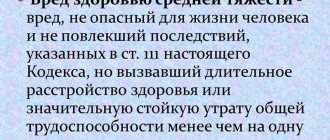In accordance with Part 1 of Art. 38 of the Criminal Code of the Russian Federation, it is not a crime to cause harm to a person who has committed a crime when he is detained in order to bring him to the authorities and suppress the possibility of him committing new crimes, if it was not possible to detain such a person by other means and the measures necessary for this were not exceeded.
Like necessary defense, the legality of causing harm when detaining a person who has committed a crime is determined by two groups of conditions:
a) related to the crime committed:
- existence of a crime;
- evasion of a person from arrest.
b) related to detention:
- harm is caused only to the person who committed the crime;
- forced nature and purpose of causing harm;
- not exceeding the measures necessary for detention.
Conditions of legality relating to the crime committed
Various circumstances may indicate that the detainee has committed a crime:
- the person is caught in the act of committing it;
- there are traces of a crime on him and his clothes;
- victims or eyewitnesses pointed to this person as having committed a crime, etc.
Evasion of a person from arrest means either an attempt to hide, or his categorical refusal to go to the appropriate authority. If the detainee actively resists arrest, actions to detain the person who committed the crime develop into necessary defense.
Causing harm when detaining a person who has committed a crime
Article 38. Causing harm during the detention of a person who has committed a crime
1. It is not a crime to cause harm to a person who has committed a crime when he is detained to be brought to the authorities and to suppress the possibility of him committing new crimes, if it was not possible to detain such a person by other means and the measures necessary for this were not exceeded.
2. Exceeding the measures necessary to detain a person who has committed a crime is recognized as their obvious discrepancy with the nature and degree of public danger of the crime committed by the detainee and the circumstances of the detention, when the person is unnecessarily caused clearly excessive harm not caused by the situation.
Such an excess entails criminal liability only in cases of intentional harm.
In accordance with Art. 38 of the Criminal Code of the Russian Federation, it is not a crime to cause harm to a person who has committed a crime during his detention in order to bring him to the authorities and suppress the possibility of him committing new crimes, if it was not possible to detain such a person by other means.
Detaining persons who have committed a crime is one of the necessary elements of the fight against crime. This measure is not associated with the suppression of a crime, as a necessary defense, but is pursued with the goal of bringing the offender to the authorities to administer justice and suppress the possibility of him committing new crimes.
Criminal law is interested in the forcible detention of a criminal, i.e. when he is forced to suffer harm.
This situation occurs when the criminal does not comply with the legal demands of the detainees and tries to escape. If there is resistance or attack on the detainees, the provision of necessary defense comes into force.
Any citizen has the right to detain a criminal, regardless of whether he has the opportunity to seek help from government officials or whether he does not have such an opportunity.
For a police officer, this is not only a right, but also a duty.
The actions of citizens aimed at suppressing criminal attacks and detaining the criminal are lawful and do not bear criminal or other liability, even if they were forced to cause harm to the criminal.
Consequently, the legal basis for detaining a criminal is that he has committed an obvious crime.
The detention of a criminal is expressed only in the commission of active actions.
The very act of causing harm to a criminal is carried out through physical or mental violence, and can also be very significant, therefore there is a need to establish the limits of the use of detention.
The legal basis here is the evasion of lawful arrest by a person who has committed an obvious crime, because when the offender submits to the demands of the arresting person, causing any harm is meaningless.
The factual basis is determined by the situation of the arrest, which indicates that it was necessary to cause harm to the criminal in order to detain him.
Therefore, causing harm to a criminal without the need for forced detention is illegal.
The conclusion that it is impossible to detain a criminal without causing him harm is made on the basis of:
¨ the person who committed the crime refuses to obey
¨ strengths, means and capabilities of both sides, i.e. age, gender, physical condition,
¨ number of persons on both sides,
¨ armament of the criminal and the detainee
¨ and other factors indicating that the latter has no real opportunity to detain a criminal without causing him harm.
Thus, the validity of causing harm to a person who has committed an obvious crime is determined by the situation of detention in which a citizen does not have a real opportunity, without serious danger to himself and others, to carry out non-violent detention of a criminal evading such detention, which necessitates causing him some harm.
The circumstances determining the legality of detaining a criminal should be divided into two groups:
1. Relating to the fact of the commission of a crime.
2. Relating to the implementation of detention.
Circumstances relating to the commission of a crime:
n the commission of a crime by a person, completed or unfinished, for reasons beyond the control of the perpetrator and if after this the person, avoiding responsibility, tries to escape
n the crime committed (intentional or careless) poses an increased danger to society.
Circumstances related to the detention:
¨ the detainee must be sure that it is this person, and not some other person, who committed the crime
¨ the detainee must have every reason to believe that the criminal will evade investigation and trial
¨ the purpose of detention is to deliver the person who committed the crime to the authorities and to suppress the possibility of him committing new crimes
¨ harm can only be caused to the detained criminal, his person and his property. Causing harm to third parties when detaining a criminal is unacceptable
¨ the harm caused is recognized as legitimate if it corresponded not only to the danger of an attack but also to the situation in which the criminal was detained.
In this regard, two situations are distinguished:
a) Relatively favorable environment - this environment indicates that the detainee is clearly stronger than the detainee, and also realizes that he can detain the criminal without causing him serious harm (the average severity of harm is the upper limit).
b) An unfavorable situation means that the detainee is in a disadvantageous position (inferior in strength, etc.) and this justifies causing harm to the criminal opposing the arrest, corresponding to the danger of the attack he committed.
At the same time, the harm caused to the criminal during arrest should be minimal.
The detention of a person who has committed a crime is aimed at bringing him to justice, therefore, causing his death during the detention process is, as a general rule, not allowed.
From the above it follows that an action, although falling under the characteristics of an act provided for by criminal law, but aimed at detaining a person at the time or immediately after he commits a crime for the purpose of transferring the detainee to the authorities, is not a crime, unless there was a clear discrepancy in the measures of detention the nature and degree of public danger of the crime and the circumstances of the detention.
Commentary on Article 38 of the Criminal Code of the Russian Federation
1. A number of regulations provide for the right to detain persons suspected of committing a crime or evading punishment (for example, in the Laws on the Police, on the Internal Troops of the Ministry of Internal Affairs of Russia, on state security, etc.). In this case, the forced use of physical force, special means and weapons is permissible, which can cause harm to the detained person.
The power to detain a person who has committed a crime, including causing harm to him, belongs not only to specially authorized law enforcement officials, but also to any citizen who wishes to use this power. Thus, the actions of citizen A., who detained citizen U. until the arrival of police officers, who committed a crime in his apartment at night, broke out, tried to leave the scene of the crime, and then showed active resistance to the police officers, cannot be considered as intentional causing harm and do not constitute an offense crimes <1>.
——————————— <1> Determination of the judicial panel for criminal cases of the Sverdlovsk Regional Court dated September 21, 2007 in case No. 22-M-515/2007 // Bulletin of judicial practice in criminal cases of the Sverdlovsk Regional Court (third - fourth quarters of 2007).
2. The commented norm contains two important, practically significant guarantees: it protects against unjustified prosecution for causing harm during detention and protects the suspect (accused) from possible lynching and reprisals (for the concepts of suspect, accused, see Articles 46, 47 of the Code of Criminal Procedure ).
3. The detention of a person who has committed a crime should be distinguished from necessary defense, the legal assessment of which is carried out according to the rules provided for in Art. 37 of the Criminal Code. Provisions of Art. 38 of the Criminal Code are applied in cases where a socially dangerous attack has already been completed or stopped and harm is caused to the person who committed the crime, solely for the purpose of detaining him for delivery to the authorities and preventing him from committing a new crime. If the detained person resists and uses violence against the subjects carrying out his detention, then the latter again have the right to the necessary defense. This is important due to the fact that the law establishes more stringent conditions for the legality of causing harm during detention compared to the conditions for the legality of necessary defense and, as a result, stricter liability for violating the limits of detention.
4. Causing harm during the detention of a person who has committed a crime is justified, and therefore excludes public danger, crime and, therefore, punishability in the presence of the following mandatory conditions:
1) the purpose of detention must be related to the delivery of the person to the authorities and the suppression of the commission of new crimes. Such detention can be carried out both immediately after the execution of a crime, and after some time (for example, the detention of a suspect who fled the scene of a crime, or a convicted person who escaped from custody). The indication in the law of the commission of a crime should be understood broadly - both the commission of a crime and a socially dangerous act by a person who is not recognized as the subject of the crime, if the detainee was not aware of this. In this case, bringing a person to justice for violating the conditions of the legality of detention would mean objective imputation. The detention of the so-called imaginary criminal is subject to assessment according to the rules of error of fact, i.e. taking into account the principle of subjective imputation.
Causing harm out of revenge or for other reasons to a person who committed a crime, but did not try to escape or was already detained, cannot be considered according to the rules of the commented article and entails liability on a general basis under the articles of the Criminal Code on intentional crimes against the person (including in mitigating circumstances, for example, in a state of passion);
2) harm (both physical and property) must be of a forced nature and can only be caused to the detainee (and not to third parties), since it was not possible to detain him by other means. The existence of this condition is established in each specific case, taking into account the circumstances of the arrest and the rule of proportionality, known in relation to necessary defense;
3) when causing harm, there should be no obvious allowance, i.e. deliberate excess of the measures necessary for detention, as defined in Part 2 of the commented article, which is also determined by the criterion of proportionality.
The law characterizes the excess of detention measures as a clear (i.e. obvious, indisputable) discrepancy between these measures and the nature and degree of public danger of the crime committed by the detained person and the circumstances of the detention, when the person is subjected to excessive harm not caused by the situation. In this case, it is necessary to take into account the danger of the crime committed by the person being detained, as well as the situation and circumstances of the detention. Thus, it is unjustifiable to cause serious harm to health to a person who has committed a minor crime, even if it was impossible to detain him in any other way. It is also unlawful to inflict grievous harm on a person who has committed, for example, a particularly serious crime, but if under the given circumstances it was possible to detain him in a less dangerous way. The circumstances of detention may relate to the characteristics of both the detainee and the detainees (the number of detainees and detainees, whether they have weapons, place, time, method of detention, the opportunity to seek help, the availability of options for using other, less dangerous methods and means of detention).
Thus, the excess of detention measures is associated with two circumstances: the nature and degree of public danger of the crime committed, and the situation of detention. Causing excessive harm entails criminal liability only if there is an intentional form of guilt. The culprit, causing harm to the detained person, is aware of the socially dangerous nature of his actions, understands their obvious discrepancy with the nature and degree of social danger of the crime committed by the detained person and the circumstances of the detention, in particular, that the harm caused by him is clearly excessive and is not caused by the need for detention and its circumstances .
5. Based on the goals and conditions of the legality of detention, the Criminal Code provides for a special rule on liability only for murder (Part 2 of Article 108) and for causing grievous or moderate harm to health (Part 2 of Article 114), committed when measures are exceeded, necessary to apprehend the person who committed the crime. Destruction or damage to someone else's property causing significant damage (Article 167 of the Criminal Code), committed in violation of the conditions for the legality of detention, is considered an act under mitigating circumstances (clause “g”, Part 1, Article 61 of the Criminal Code).
In other cases, criminal liability for exceeding the measures necessary for detention, for example, in case of careless infliction of physical harm, is excluded, which does not relieve the person from other types of liability associated with causing damage, for example, civil law (see Chapter 59 of the Civil Code on obligations due to harm).







